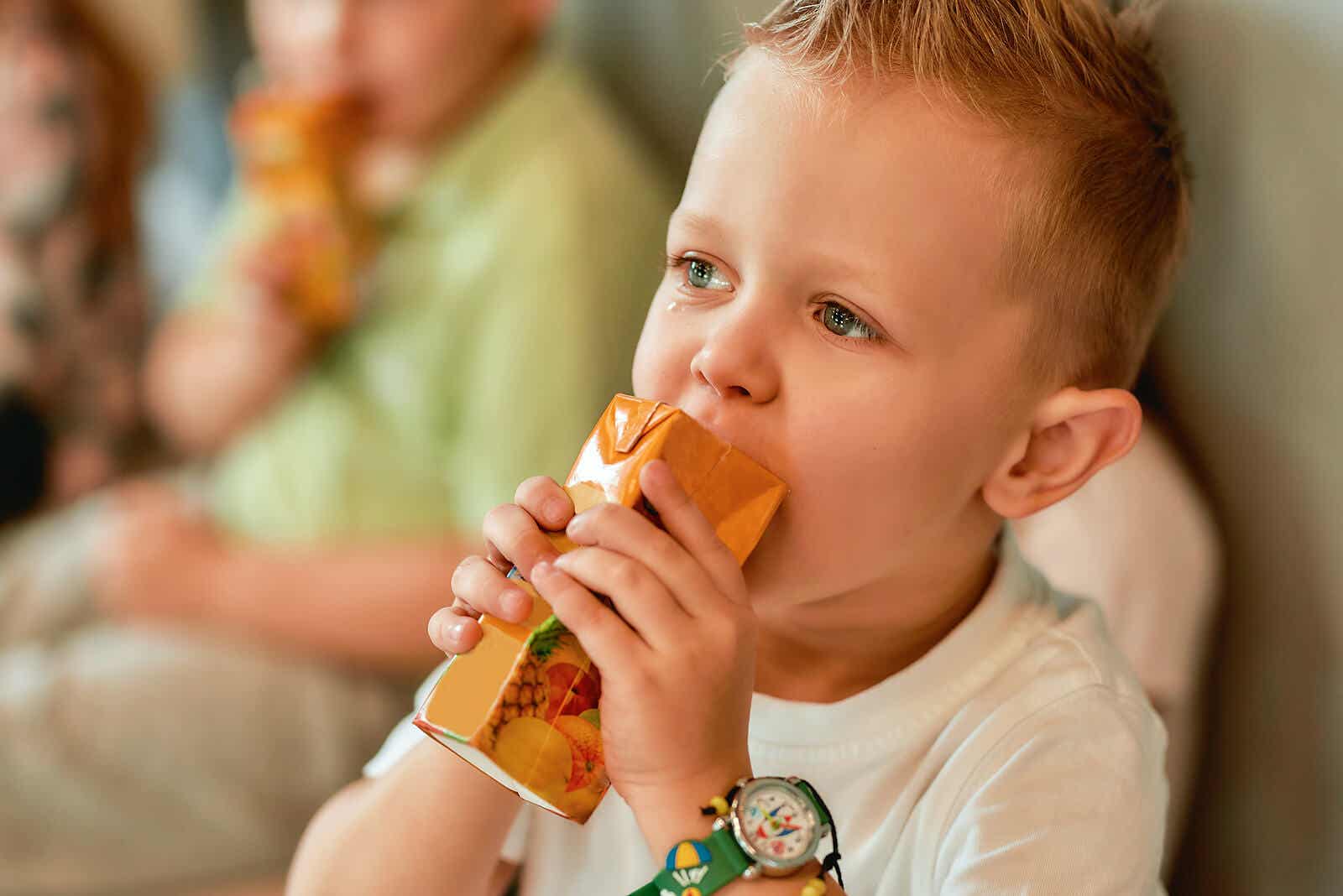What Are the Worst Foods for Babies?

It’s important to pay special attention to infant nutrition because, during the first years of life, habits that will determine future eating behaviors are established. For this reason, we must make a conscious effort to care for the diets of our little ones. But instilling good habits in childhood isn’t enough. We also need to ensure an optimal supply of nutrients in order to avoid problems related to the growth and health of children. In this article, we’re going to show you which are the worst foods for babies and why we recommend avoiding them whenever possible.
The worst foods for babies
Soft drinks and juices

Soft drinks and juices have high glycemic carbohydrates inside, usually fructose and glucose.
According to research in the journal Nutrients, consumption of these elements contributes to the development of metabolic syndrome. And this, in turn, leads to obesity and diabetes.
It’s important to keep in mind that the intake of simple sugars dissolved in a liquid medium is much worse than consuming them through solid foods. This is because there’s always a portion of fiber in them when they’re in their solid form that modulates the absorption process.
When they’re provided through beverages, on the other hand, the absorption of sugars is almost complete and the blood glucose peak is much higher.
Breakfast cereals
Most breakfast cereals we find in supermarkets have added simple sugars, among other additives. They’re also very low-quality products, which are unable to provide noble carbohydrates.
Their labels claim mineral and vitamin content, but this doesn’t compensate for their other deficiencies.
For this reason, when choosing a cereal to offer babies, the best choice will always be oatmeal. This food has soluble fiber, which is necessary to promote the growth of the bacteria that make up the intestinal microbiota. It’s also effective for the prevention and treatment of constipation.
Powdered chocolate
Cocoa as such is a food of vegetable origin with a great number of benefits for the body. For example, it contains antioxidant phytonutrients inside, such as flavonoids.
However, powdered chocolate preparations are characterized by their low concentration of this ingredient and their high content of simple sugars.
If you want to offer cocoa to children, make sure it’s free of added carbohydrates. This type of cocoa has a bitter taste. So, if you want to sweeten it, the best option is to add chopped fruit.
Precooked foods
A healthy diet is characterized by being varied, but also by the consumption of fresh foods. This is the opposite of the consumption of industrial ultra-processed foods.
Precooked foods are part of this group and have several additives, trans fats, and excessive amounts of salt. For this reason, we recommend you avoid them and always opt for homemade food.
Pastries
Pastries are characterized by their high content of simple sugars and trans fats. The intake of the latter can increase the risk of developing chronic and preventable illnesses in the long term. This is especially due to their inflammatory potential. A study published in the journal Diabetes & Metabolic Syndrome demonstrates this.
Not even home-prepared baked goods are a good choice. These also contain refined flours and large amounts of sugar, which aren’t at all beneficial for metabolic health.
To provide carbohydrates to your child’s diet, it’s better to opt for tubers and legumes rather than flour.

Avoid the worst foods for babies
The foods we’ve mentioned above are the worst food for babies, so we suggest you restrict them in your little one’s diet.
The best choice is to opt for homemade food and for the consumption of fresh foods, always prioritizing vegetables and fish. This will ensure an optimal nutritional intake to cover daily needs and ensure proper growth.
In addition, avoiding exposure to ultra-processed products and excessively sweet foods will condition the child’s dietary habits in a positive way. By not getting them used to these unhealthy foods when they’re young, they’ll be less likely to demand them later on.
It’s important to pay special attention to infant nutrition because, during the first years of life, habits that will determine future eating behaviors are established. For this reason, we must make a conscious effort to care for the diets of our little ones. But instilling good habits in childhood isn’t enough. We also need to ensure an optimal supply of nutrients in order to avoid problems related to the growth and health of children. In this article, we’re going to show you which are the worst foods for babies and why we recommend avoiding them whenever possible.
The worst foods for babies
Soft drinks and juices

Soft drinks and juices have high glycemic carbohydrates inside, usually fructose and glucose.
According to research in the journal Nutrients, consumption of these elements contributes to the development of metabolic syndrome. And this, in turn, leads to obesity and diabetes.
It’s important to keep in mind that the intake of simple sugars dissolved in a liquid medium is much worse than consuming them through solid foods. This is because there’s always a portion of fiber in them when they’re in their solid form that modulates the absorption process.
When they’re provided through beverages, on the other hand, the absorption of sugars is almost complete and the blood glucose peak is much higher.
Breakfast cereals
Most breakfast cereals we find in supermarkets have added simple sugars, among other additives. They’re also very low-quality products, which are unable to provide noble carbohydrates.
Their labels claim mineral and vitamin content, but this doesn’t compensate for their other deficiencies.
For this reason, when choosing a cereal to offer babies, the best choice will always be oatmeal. This food has soluble fiber, which is necessary to promote the growth of the bacteria that make up the intestinal microbiota. It’s also effective for the prevention and treatment of constipation.
Powdered chocolate
Cocoa as such is a food of vegetable origin with a great number of benefits for the body. For example, it contains antioxidant phytonutrients inside, such as flavonoids.
However, powdered chocolate preparations are characterized by their low concentration of this ingredient and their high content of simple sugars.
If you want to offer cocoa to children, make sure it’s free of added carbohydrates. This type of cocoa has a bitter taste. So, if you want to sweeten it, the best option is to add chopped fruit.
Precooked foods
A healthy diet is characterized by being varied, but also by the consumption of fresh foods. This is the opposite of the consumption of industrial ultra-processed foods.
Precooked foods are part of this group and have several additives, trans fats, and excessive amounts of salt. For this reason, we recommend you avoid them and always opt for homemade food.
Pastries
Pastries are characterized by their high content of simple sugars and trans fats. The intake of the latter can increase the risk of developing chronic and preventable illnesses in the long term. This is especially due to their inflammatory potential. A study published in the journal Diabetes & Metabolic Syndrome demonstrates this.
Not even home-prepared baked goods are a good choice. These also contain refined flours and large amounts of sugar, which aren’t at all beneficial for metabolic health.
To provide carbohydrates to your child’s diet, it’s better to opt for tubers and legumes rather than flour.

Avoid the worst foods for babies
The foods we’ve mentioned above are the worst food for babies, so we suggest you restrict them in your little one’s diet.
The best choice is to opt for homemade food and for the consumption of fresh foods, always prioritizing vegetables and fish. This will ensure an optimal nutritional intake to cover daily needs and ensure proper growth.
In addition, avoiding exposure to ultra-processed products and excessively sweet foods will condition the child’s dietary habits in a positive way. By not getting them used to these unhealthy foods when they’re young, they’ll be less likely to demand them later on.
All cited sources were thoroughly reviewed by our team to ensure their quality, reliability, currency, and validity. The bibliography of this article was considered reliable and of academic or scientific accuracy.
- Islam MA, Amin MN, Siddiqui SA, et al. Trans fatty acids and lipid profile: A serious risk factor to cardiovascular disease, cancer and diabetes. Diabetes Metab Syndr. 2019 Mar-Apr;13(2):1643-1647. doi: 10.1016/j.dsx.2019.03.033. Epub 2019 Mar 16. PMID: 31336535.
- Taskinen MR, Packard CJ, Borén J. Dietary Fructose and the Metabolic Syndrome. Nutrients. 2019 Aug 22;11(9):1987. doi: 10.3390/nu11091987. PMID: 31443567; PMCID: PMC6770027.
This text is provided for informational purposes only and does not replace consultation with a professional. If in doubt, consult your specialist.








